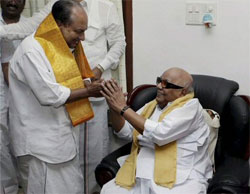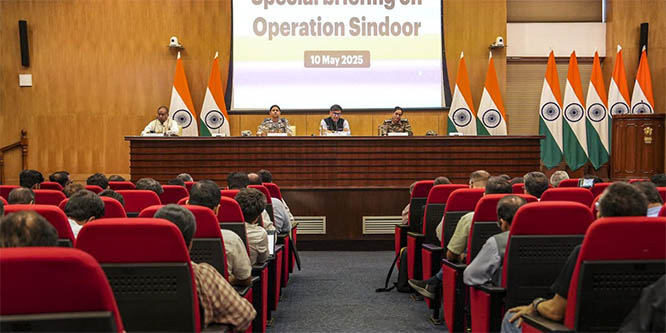
Chennai, April 29: Congress leader and Defence Minister A K Antony today met DMK chief M Karunanidhi as part of consultation process among UPA allies on the Presidential election to arrive at a consensus leader to succeed incumbent Pratibha Patil, who is retiring on July 25.
After more than an hour-long meeting, Antony told reporters that he would convey the DMK leader's views on the issue to Congress President Sonia Gandhi.
"It was a very, very fruitful meeting. I will report to the Congress President whatever he said", he told reporters, refusing to disclose details about his discussion.
Observing that Gandhi had asked him to meet the DMK chief to discuss about the "present political situation", he said "What we discussed, I will convey to the Congress President".
He said Karunanidhi is one of the seniormost leaders in the country and "we always value his advice".
DMK Parliamentary party leader T R Baalu and Karunanidhi's daughter and party MP Kanimozhi were also present.
Antony's meeting with Karunanidhi comes close on the heels of Agriculture Minister and NCP leader Sharad Pawar's consultation with the Congress President a few days ago. Pawar was understood to have urged the Congress chief on the need for a consensus on the choice.
Congress sources said that a meeting between Trinamool Congress chief Mamata Banerjee and Gandhi is also expected.
Vice President Hamid Ansari and Finance Minister Pranab Mukherjee are among the names doing the rounds in the ruling party circles for the top post.
Talks with parties outside UPA would be held after completion of the consultations in the ruling alliance, the sources said.
Gandhi, as also Prime Minister Manmohan Singh, is expected to have interaction with Samajwadi Party chief Mulayam Singh Yadav and BSP supremo Mayawati.
UPA as well as NDA leaders admit that support of Mulayam, Mamata and Mayawati could be crucial for the Presidential election.








Comments
Add new comment